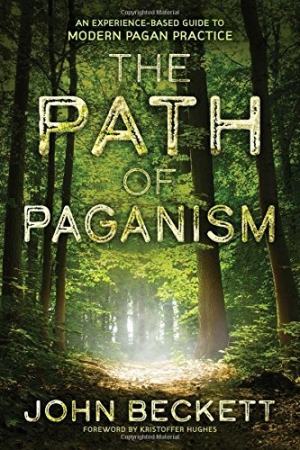The Path of Paganism
An Experience-Based Guide to Modern Pagan Practice
Beckett affirms that pagan religions honor nature, the gods, our ancestors, and our own unique place in the world.
John Beckett’s The Path of Paganism is not just a book about Paganism, it’s a book that tells us how to be a pagan—not an easy thing these days, when the whispers of the natural world and the call that’s heard with the heart are submerged in the fast-flowing current of the quest for material success. In such a world, Beckett shows the wisdom of pagan practice, and why it can inspire us to dive in deeply and live wholeheartedly, with integrity, and with joy.
Beckett, a Druid in the Order of Bards, Ovates, and Druids, serves as the coordinating officer of the Denton Covenant of Unitarian Universalist Pagans. “Good religion is dangerous religion—it challenges us to confront our preconceived notions and live up to our values,” Becket writes, adding that, in these times, this call “should come with a sense of urgency and priority.” Paganism is a way of seeing the world and our place in it; but it’s not an easy path, he warns. It demands challenging the assumptions of mainstream society and becoming devoted to truth, because only truth can provide a solid base from which to embark on an exploration of the universe, the self, the gods, and the community of living beings.
Beckett shows that while knowledge is important, paganism isn’t just about what you know, it’s also about “the sun on your face, the wind on your skin, the dirt on your fingers, and the rain on your shoulders. It’s about that special feeling you get when you stand under the full moon. It’s about lighting a candle, pouring an offering, and saying a prayer.”
The best religions will teach us how to embody virtues and values that will be there for us, in us, when we are faced with difficult situations. Beckett affirms that pagan religions do this from a perspective that honors nature, the gods, our ancestors, and our own unique place in the world. Above all, he says, paganism is not about doctrine, but about experience; not about rules, but about relationships; not about intellect, but about the soul.
Reviewed by
Kristine Morris
Disclosure: This article is not an endorsement, but a review. The publisher of this book provided free copies of the book to have their book reviewed by a professional reviewer. No fee was paid by the publisher for this review. Foreword Reviews only recommends books that we love. Foreword Magazine, Inc. is disclosing this in accordance with the Federal Trade Commission’s 16 CFR, Part 255.

